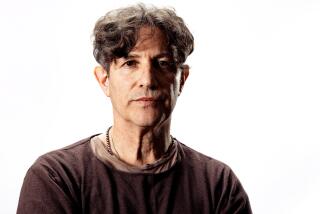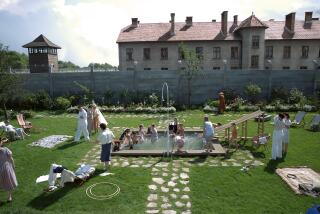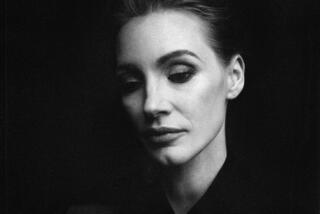Review: Niki Caro and Jessica Chastain create an emotionally satisfying ‘Zookeeper’s Wife’
- Share via
Belief begets belief, and the faith that star Jessica Chastain and director Niki Caro have in “The Zookeeper’s Wife” turn this World War II drama into an emotional experience that is straight-ahead but satisfying.
The story of Antonina Zabinska (Chastain), who along with her husband Jan hid some 300 Jews on the grounds of the Warsaw zoo they ran, may sound like a standard Holocaust tale of rescue and redemption, but even if there was such an animal, “The Zookeeper’s Wife” is not it.
For the record:
8:52 p.m. Jan. 18, 2025An earlier version of this story misspelled Andrij Parekh’s last name as Parkh.
As adapted by the veteran Angela Workman from Diane Ackerman’s based-on-fact bestseller, this film has its share of Nazi atrocities, but it is not really about recreating wartime horrors.
Rather, with Caro and Chastain as its lodestars, the film concentrates on the wrenching personal cost that being heroic extracted from all involved, how much it took out of everyone to survive years of life-and-death situations. Zabinska may have been someone who, in Ackerman’s words, “performs radical acts of compassion,” but nothing about doing that was easy.
The chameleon-like Chastain’s all-in quality of commitment she invariably brings to her work is very much in evidence here.

Jessica Chastain and Daniel Brühl star in “The Zookeeper’s Wife.”
Perhaps because it focuses on a woman and has a female writer and director, “Zookeeper’s” story took 10 years to make it to the screen, but, especially where Caro and Chastain are concerned, it’s clear that the right choices were ultimately made.
Best known as the director of “Whale Rider” and the underappreciated “McFarland, USA,” Caro is something of a moviemaking throwback in her belief in expressive storytelling that hugs the sentimental line but does not go over it.
As for the chameleon-like Chastain, the all-in quality of commitment she invariably brings to her work is very much in evidence here, giving Antonina’s story a lived-in quality that is invaluable.
The real-life Antonina was very much an animal whisperer, shy with people but capable of real and direct bonding with beasts of all sorts, so it helps that Chastain is herself a committed animal lover, completely at ease interacting with the numerous flesh-and-blood zoo denizens she’s photographed with.
“Zookeeper’s Wife” opens in the summer of 1939, a tranquil calm before the storm that shows us the special life Antonina, her husband Dr. Jan Zabinski (Johan Heldenbergh) and their young son share on the grounds of the zoo.
On this particular night, the family is host to a colleague from Germany, Lutz Heck (top German actor Daniel Bruhl), the head of Berlin’s zoo, who manages to combine a commitment to preservation with the zeal of the big game hunter.
After a demonstration of how effectively Antonina deals with animals in trouble, a human-made crisis occurs. Germany invades Poland, leading to death and chaos. One of the film’s most effective sequences, showing wild zoo animals on the loose in the city’s streets, is a splendid metaphor for the world-turned-upside-down universe the Zabinskis now live in.
Very soon Heck, who has been appointed the Third Reich’s chief zoologist, returns to the zoo. He wants to take Warsaw’s best animals back to Berlin with him “for safekeeping,” but he also clearly feels an attraction to Antonina, a dynamic that Bruhl and Chastain expertly play out for the entire film.
Though her husband Jan is involved in the resistance, it takes some time for Antonina to become comfortable with the idea of hiding Jews on the premises, and that gradual process helps make the decision believable.
To keep the zoo open during the occupation, Jan comes up with the idea of raising pigs, and when he offers to use garbage from the Warsaw ghetto to feed them, it is because he wants access to that closed-off area so he can help rescue its residents.
Key to this plan succeeding is Antonina’s ability to placate and distract Heck, who has reasons for frequent visits because of arcane animal breeding schemes he is involved in. How to be nice but not too nice to a powerful, ruthless man who acts as if Antonina were unmarried illustrates “Zookeeper’s” notion that “there is a cost to doing the right thing.”
Movingly photographed by cinematographer Andrij Parekh, “Zookeeper’s Wife” is filled with haunting images: ashes from the burning ghetto fall on the zoo like out-of-season snow, small children trustingly raise their hands to be lifted onto trains that will take them to their death, while orphanage director Janusz Korczak (Arnost Goldflam) refuses to abandon them.
Moments like this, and Chastain and Caro’s joined passion, ensures that we live this couple’s wartime experience both with and through them. “Zookeeper’s Wife” is not a hard-edged film, but its impact is there. Even when the war ends in 1945, a sense of the demands of what they’ve done never goes away.
-----------------
“The Zookeeper’s Wife”
MPAA rating: PG-13 for thematic events, disturbing images, violence, brief sexuality, nudity and smoking.
Running time: 2 hours, 6 minutes.
Playing: In general release.
See the most-read stories in Entertainment this hour »
Movie Trailers
ALSO
Review: ‘The Settlers’ delves into Israeli politics and religion
Review: The Israeli hit ‘The Women’s Balcony’ is a warm culture-clash comedy that makes sharp points
Review: ‘Alien’ haunts outer space thriller ‘Life’
More to Read
Only good movies
Get the Indie Focus newsletter, Mark Olsen's weekly guide to the world of cinema.
You may occasionally receive promotional content from the Los Angeles Times.











